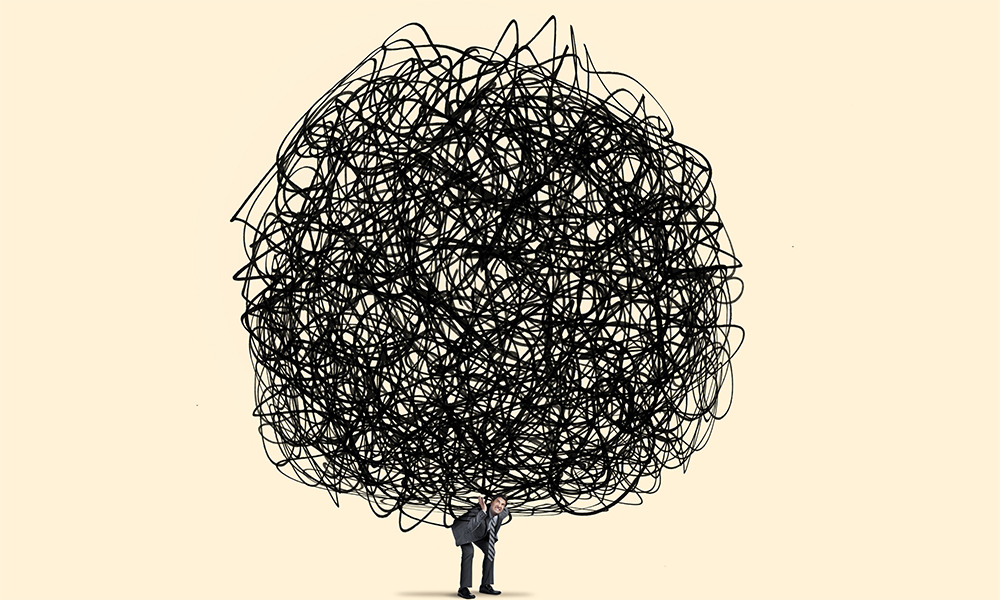I was recently speaking to a leader, whose business was performing below expectations. The leader kept on rehashing the things that had not worked and the various mistakes that the team had made. Rather than focusing on solving the issue, he was ruminating over the problem.
So, what is rumination? Psychology Today defines it as when “you continuously think about the various aspects of situations that are upsetting”. Essentially, if you spend hours going over your past mistakes and future anxieties, you are ruminating. An article published by the Center for Creative Leadership, The #1 Reason You Are Stressed and How to Change It, mentions some examples we can all relate to:
Rumination is what you do when you wake up at 3 a.m. and can’t get back to sleep because you are thinking about all the stuff you have to do and all the things you haven’t done and should have. It’s the kind of thinking that happens when you spiral into worst-case scenarios when your teenager has missed her curfew or you are waiting on medical results. It’s what happens when you leave a meeting where you stumbled through your presentation and you can’t stop thinking about what you should have said.
This kind of obsessive thinking is different from reflection. Reflecting is a positive process, in which you review yesterday’s bad decisions and plan for tomorrow in a productive way. Ruminating, on the other hand, is a form of self-sabotage. In fact, it is the key cause of workplace stress.
In the article, Defeating Rumination, Nick Petrie differentiates between “pressure” and “stress”, based on decades of research by Dr. Derek Roger and himself. As Petrie explains, pressure leads to stress only when we start ruminating:
While recognizing stress as a major problem in the workplace, many people assume that there is no escape from such stress… This assumption is wrong, however, and the core reason is the failure to distinguish between ‘pressure’ and ‘stress’.
Pressure results from external events, such as, for example, a failed project or a looming deadline. Pressure is, indeed, inevitable, and there is little we can do about it.
Stress, in contrast, emerges not from an event – past or future – but from our reaction to the event… The culprit is rumination – the tendency to think over and over about something that has happened in the past or might happen in the future.
Rumination traps you in a cycle of worry, and prevents you from feeling fulfilled and happy. It ruins your self-confidence and increases self-doubt. Ultimately, this affects the way the world sees you: if you keep focusing on your flaws and errors, other people will start doing the same.
Ruminating also distracts your attention from the present moment. Instead of focusing on what’s happening right now, your mind becomes fixated on something in the past (which you can’t change) or in the future (which you can’t control). What’s worse, obsessive self-criticism creates a negative mental blueprint, hindering your chances of success in the coming days and months.
Rumination is especially common among senior leaders. In the article, How to Stop Being Your Company’s ‘Chief Rumination Officer’, Michael Campbell highlights a revealing incident that took place during a resiliency workshop with an executive team. Upon sharing assessment scores, it was found that the CEO had the highest rumination score by far.
I remember the CEO looking at everyone else’s score and asking (rather animatedly), “Why doesn’t anyone care as much as I do?” The COO, who had the lowest rumination score on the team said, “I care a lot. I’m just not going to ruminate about it.”
In that short exchange rests one of biggest struggles leaders face. Leaders who are high ruminators do so because they believe ruminating provides some value. They think it means they care, or that they’ll be prepared for the worst.
However, as Campbell goes on to explain, rumination isn’t the same as caring and preparation. In fact, it’s counterproductive: it makes you ineffective, unhealthy and miserable. And as a leader, these ill-effects aren’t limited to you! They percolate down into your teams and the rest of the organisation.
The good news is that since rumination is something we do to ourselves, the solution is also in our own hands. While pressure is inescapable, stress isn’t. If you can bring your negative thoughts under control, you will become a calmer, happier, healthier and more effective leader.
Here are seven suggestions to help you kick the ruminating habit:
1. Focus on the present
Obsessing over upsetting situations keeps you trapped in the past (“If only I had done that differently.”) or the future (“What if something bad happens?”). As a result, you become paralysed when it comes to the present, unable to find any joy or purpose in it.
So, start building awareness of your own thoughts. If you find yourself drifting into worry, immediately refocus on what’s in front of you and what you can control. In the article mentioned above, Petrie suggests a sudden physical action – such as clapping your hands or stretching in your chair – to bring yourself back to the present moment. He also suggests the following exercise to redirect your attention towards the right things:
Draw a circle on a page, and write down all of the things you can control or influence inside of it and all of the things you cannot outside of it. Remind yourself that you can care about externalities – your work, your team, your family – without worrying about them.
2. Learn to process mistakes
One of the root causes of rumination is that we want to be perfect, all the time. Against this impossible standard, each and every one of us is bound to fail! So, you must reorient the way in which you view your shortcomings. First, accept them as inevitable – perfection is neither possible, nor desirable.
Second, start fully processing your mistakes when they occur: allow yourself to feel the discomfort and review what you’ve learned. Then, move on. Resist the temptation to think about the situation again and again – remind yourself that you’ve already analysed it thoroughly, and there’s nothing more you can do about it.
3. Reframe problems as opportunities
Instead of getting distracted by bad decisions you made in a similar scenario in the past, bring your attention to the present opportunities. Could this be a chance to up your game and come up with a creative solution? Could it lead to your advancement? Remind yourself that the lessons you’ve learned have actually made you better equipped to take on this challenge.
4. Highlight your successes
If you’re prone to rumination, your brain tends to dwell on failures and embarrassments. Which is why you need to make a conscious effort to highlight your victories. Try this: list ten of your biggest life successes, and ten small day-to-day successes. Next time your mind wanders over to your setbacks, firmly shift your thoughts towards what you’ve done well – consult the list if you need to!
5. Get above it all
Interrupt your worries with this question: Will continuing to focus on this help me, my team or my organisation? If the answer is no, let it go. Petrie also recommends the following mental exercise:
One analogy that we use is that of a loft above a large room. From this loft, you watch a flood enter the front door and go out the back door. This is the mindset to defeat rumination. Let the thoughts you can do nothing about in the front door (trying to block them out won’t work) and watch them from your mental loft go through the house and out the back door.
6. Change the perspective
When you get stuck in a loop of upsetting thoughts, molehills can start to look like mountains. Snap out of this state by giving yourself a quick reality check: How much will this issue matter in a week, a month, a year? This will help you calm down and put things back into perspective.
7. Have “walk and talk” meetings
The previously mentioned article from the Center for Creative Leadership explains that teams often keep talking about the same problem over and over, without moving towards a solution.
One of the most effective ways to break this pattern is to go for a walk and talk. Just 5 to 10 minutes walking inside or out breaks people out of a physical pattern. When the body moves, the mind will follow and cognitive patterns will shift, too.
So, this week, let’s start curbing our tendency to ruminate. Instead, let’s bring a positive and productive mindset to work – for ourselves, as well as for our teams.
As always, I look forward to your thoughts.








Comments